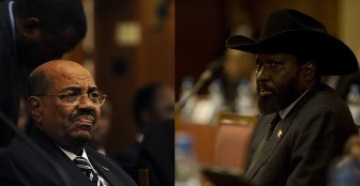Sudan’s Bashir welcomes Addis Ababa deal as Kiir vows no compromise on border areas
March 14, 2012 (KHARTOUM) – Sudan’s President Omar Al-Bashir received on Wednesday a briefing from his country’s negotiating team on the two deals signed with neighbouring South Sudan on nationality and the demarcation of common boundaries.

The development marked the first sign of progress in long stalled talks between Khartoum and Juba over issues arising from the secession of South Sudan from Sudan in July last year.
According a statement by the AUHIP, the initialled agreement on nationality allows nationals of each state to enjoy in the other State the “freedom of residence; freedom of movement; freedom to undertake economic activity; and, the freedom to acquire and dispose of property” whereas the initialled agreement on borders provides the basis for commencing the exercise of demarcating common boundary.
The agreements are due to be signed by Sudan’s President Bashir and his South Sudanese counterpart, Salva Kiir Mayardit, during a summit planned to be held in the South’s capital Juba “in the near future”, the statement said.
Sudan’s chief negotiator, Idris Abdel Gadir, said in a press conference held following his return from Ethiopia on Wednesday that Bashir and Kiir would meet in Juba because their first summit was held in Khartoum.
Abdel Gadir said he hopes the upcoming summit would manage to resolve the outstanding issues, particularly with regards to oil.
Khartoum’s team also presented Bashir with a briefing on the results of negotiations. According to Sudan’s official news agency, SUNA, Bashir welcomed the outcome of the talks and lauded the efforts exerted by Ethiopia and the AUHIP.
The negotiators pointed out that other outstanding issues including oil would be discussed after security arrangements and the status of nationals of each state are settled.
Sudan’s media minister Abdullah Massar told reporters following the meeting that Bashir and vice president Ali Uthman Mohamed Taha were briefed on the outcome of Addis Ababa talks.
He added that the Sudanese government welcomes the agreements and arrangements to organise a summit between Bashir and Kiir.
Massar further pointed out that the proposed summit is yet to be scheduled but there is a committee working on the issue.
In South Sudan, meanwhile, President Kiir has spoken in an aggressive tone, accusing Khartoum of seeking to annex his country’s disputed border regions and vowing not to cede an inch of them.
Kiir, who was speaking on Tuesday in Wau, the provincial capital of Western Bahr El Ghazal, said that the government of Sudan was using “delayed tactics” to seize South Sudan’s border areas which, according to him, are rich with natural resources.
The South Sudanese leader stressed that they will not accept any demarcation process that does not bring back to his country the following areas: Kafia Kinji, Abyei, Heglig, Karasana, Kofaranas and “other main territories encroached by Sudanese armed forces”.
“Those areas will remain as part and parcel of South Sudan and we are not going to lose inch of our land to Sudan” Kiir declared.
Kiir said that the secession of South Sudan did not sunder the relations between his people and those of Sudan, saying that his government has a problem with the ruling National Congress Party (NCP) of Sudan, not with Sudanese masses.
“The Sudan government led by NCP will not be happy to see us in prosperous lives, and that is why we said that we have a problem with NCP but not Sudanese masses and we should treat Sudanese in South Sudan kindly” he concluded.
In a related development, the secretary-general of the United Nations, Ban Ki-Moon
, on Wednesday issued a statement commending the progress achieved in the talks between Sudan and South Sudan.
He said that the two agreements on nationality and demarcation of borders are an “important step forward” and that he encourages the two sides to “resolve all other outstanding matters as a matter of urgency and make the necessary compromise that will guarantee a peaceful and prosperous future for both Nations”.
(ST)
